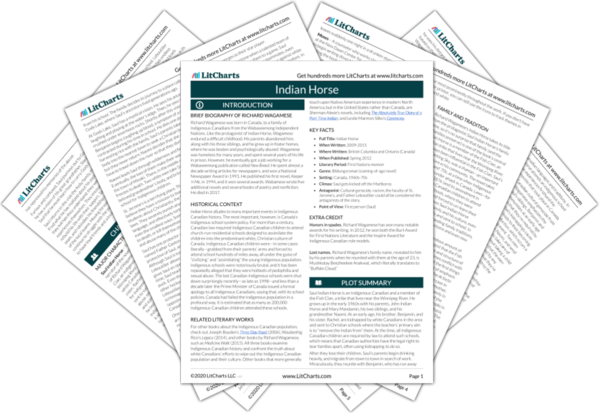Brief Biography of Richard Wagamese
Richard Wagamese was born in Canada, to a family of Indigenous Canadians from the Wabaseemong Independent Nations. Like the protagonist of Indian Horse, Wagamese endured a difficult childhood. His parents abandoned him, along with his three siblings, and he grew up in foster homes, where he was beaten and psychologically abused. Wagamese was homeless for many years, and spent several years of his life in prison. However, he eventually got a job working for a Wabaseemong publication called New Breed. He spent almost a decade writing articles for newspapers, and won a National Newspaper Award in 1991. He published his first novel, Keeper ‘n Me, in 1994, and it won several awards. Wabamese wrote five additional novels and several books of poetry and nonfiction. He died in 2017.
Historical Context of Indian Horse
Indian Horse alludes to many important events in Indigenous Canadian history. The most important, however, is Canada’s Indigenous school system policy. For more than a century, Canadian law required Indigenous Canadian children to attend church-run residential schools designed to assimilate the children into the predominant white, Christian culture of Canada. Indigenous Canadian children were—in some cases literally—grabbed from their parents’ arms and forced to attend school hundreds of miles away, all under the guise of “civilizing” and “assimilating” the young Indigenous population. Indigenous schools were notoriously brutal, and it has been repeatedly alleged that they were hotbeds of pedophilia and sexual abuse. The last Canadian Indigenous schools were shut down surprisingly recently—as late as 1998—and less than a decade later the Prime Minister of Canada issued a formal apology to all Indigenous Canadians, saying that, with its school policies, Canada had failed the Indigenous population in a profound way. It is estimated that as many as 200,000 Indigenous Canadian children attended these schools.
Other Books Related to Indian Horse
For other books about the Indigenous Canadian population, check out Joseph Boyden’s
Three Day Road (2006), Waubeshig Rice’s
Legacy (2014), and other books by Richard Wagamese, such as
Medicine Walk (2015). All three books examine Indigenous Canadian history and confront the truth about white Canadians’ efforts to wipe out the Indigenous Canadian population and their culture. Other books that more generally touch upon Native American experience in modern North America, but in the United States rather than Canada, are Sherman Alexie’s novels, including
The Absolutely True Diary of a Part-Time Indian, and Leslie Marmon Silko’s
Ceremony.
Key Facts about Indian Horse
-
Full Title: Indian Horse
-
When Written: 2009-2011
-
Where Written: British Columbia and Ontario (Canada)
-
When Published: Spring 2012
-
Literary Period: First Nations memoir
-
Genre: Bildungsroman (coming-of-age novel)
-
Setting: Canada, 1960s-70s
-
Climax: Saul gets kicked off the Marlboros
-
Antagonist: Cultural genocide, racism, the faculty of St. Jerome’s, and Father Leboutilier could all be considered the antagonists of the story.
-
Point of View: First person (Saul)
Extra Credit for Indian Horse
